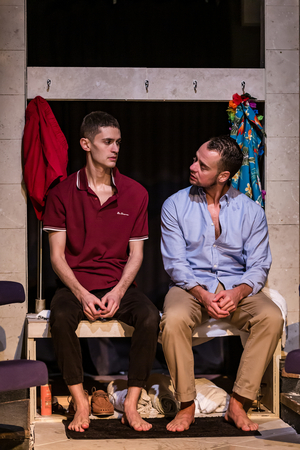Review: THE MIKVAH PROJECT, Orange Tree Theatre

![]() Josh Azouz's play The Mikvah Project was a great success when it formed part of the Orange Tree's Directors' Festival last summer. It now returns in excellent form to explore the tentative and problematic relationship between two male characters in the setting of North London Judaism.
Josh Azouz's play The Mikvah Project was a great success when it formed part of the Orange Tree's Directors' Festival last summer. It now returns in excellent form to explore the tentative and problematic relationship between two male characters in the setting of North London Judaism.
The play follows a snapshot from the lives of Avi and Eitan, who meet while bathing in a mikvah; a small pool used for a Jewish rite of spiritual cleansing. The two characters are in very different places in their lives: Eitan is an Arsenal-supporting teenager who is distracted from his schoolwork by fellow pupil Rachel and her purple bra. Avi is thirty five, married and trying for a baby with his wife. Eitan quickly develops feelings for Avi, who must decide how he wants his life to turn out.
With two new actors in the roles, Josh Zaré is wonderfully convincing as 17-year-old Eitan. He is incredibly likable, with a familiar façade of confidence masking insecurities as he rides a wave of teenage hormones. The audience is reminded of the unbearable intensity and absolute absorption of a teenage crush through Zaré's performance. It is brilliantly expressed and sometimes hard to watch.
As Avi, Alex Waldmann expresses the internal conflict of a character who is clearly in love with his wife, but challenged by his unexpected feelings for Eitan. Waldmann is very adept at identifying with Eitan's teenage desires and lack of control of his body and mind, while trying to confirm his own place in the world.
The play is the debut main stage production for director Georgia Green. She emerged as one of the standout talents of the Directors' Festival and she has managed to refine this play yet further. It feels tighter and more fluid.
The actors narrate thoughts, events and the words of other characters, as well as conversing with each other, yet the flow of the production remains smooth and natural. The movement is organic and the actors cope very well with continuous undressing, immersion and dressing again.
Despite being farfetched, Green has decided to retain the pair's spontaneous trip to Alicante. Although trimmed, the scene still sticks out, as it it unconvincing and fits awkwardly with the rest of the play.
The space of the Orange Tree is used to best effect, with Cory Shipp's design setting the mikvah itself into the floor of the theatre and using it as the dominant feature in and around which all the action is set. The corners of the theatre are smartly used as changing rooms and showers. Shipp has refined her design for this run, with sleek turquoise tiles and sparkling LED lighting in the mikvah itself.
Lex Kosanke's sound design also works very well, with subtle echoes when the characters talk inside the mikvah and booming bass in the club scenes.
The conflict that Avi feels as his religion and his sexual feelings collide is well expressed. The aggressive use of the word 'mate' after Eitan kisses him is an interesting reinforcement of Avi's view of himself as a heterosexual man. But, it would also be interesting if Azouz had included more detail within the play itself about modern and traditional Jewish opinions about homosexuality and family life.
Judaism is central to the play, but it is suggested that the relationship between the characters is problematic because Avi is married and Eitan is a teenager, rather than because the characters are both male.
This intense and tender two-hander is an immersive exploration of when real human feelings and desires clash with reality. It is very fine production that feels sincere, authentic and honest.
The Mikva Project is at the Orange Tree Theatre until 28 March
Photo Credit: The Other Richard
Reader Reviews

Videos

